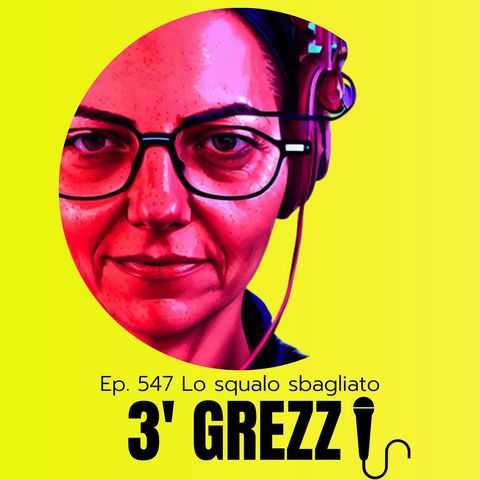3' grezzi Ep. 547 Lo squalo sbagliato

Regístrate gratis
Escucha este episodio y muchos más. ¡Disfruta de los mejores podcasts en Spreaker!
Descarga y escucha en cualquier lugar
Descarga tus episodios favoritos y disfrútalos, ¡dondequiera que estés! Regístrate o inicia sesión ahora para acceder a la escucha sin conexión.
A volte le costrizioni e quello che viene percepito come un errore finisce per diventare la molla creativa più interessante. Quindi non arrabbiatevi più di tanto davanti errori, vostri e...
mostra másTRASCRIZIONE [ENG translation below]
Non so se vi sia mai capitato di sbagliare strada e proprio per il fatto che avete sbagliato strada, scoprire qualcosa di bello, di diverso che non avevate mai visto, che non avevate mai notato. .
A me capita spesso di sbagliare strada e a volte mi capita anche di scoprire delle cose che altrimenti non avrei mai visto. Questo perché? Perché quelli che alcuni chiamano errori, in effetti sono delle costrizioni che ci portano a fare le cose in modo diverso, ma anche a vedere il mondo in modo diverso.
Un po' questo è quello che è capitato al regista Steven Spielberg quando ha fatto il film Lo squalo nel 1974. Che è successo? Che Spielberg voleva fare, aveva in mente questa questa idea di uno squalo assassino che terrorizza le spiagge. Insomma, la storia la conosciamo tutti, penso che tutti più o meno abbiamo visto, se non al cinema, almeno alla televisione qualche qualche passaggio del film Lo squalo.
L'idea originale di Spielberg era di usare un enorme pupazzo animato, mosso meccanicamente che avrebbe dovuto essere onnipresente in tutte le scene del film, quindi a mettere in evidenza ancora di più l'ossessione la paura, il modo in cui questo squalo veramente terrorizzava tutte le persone che stavano attorno.
E cosa succede? Succede però che una volta preparato questo pupazzone, immagino che ci avranno lavorato un sacco di tempo seguendo le indicazioni di Spielberg, così, cosà, grande, gigantesco, sicuramente non realistico, e che è successo? Hanno messo questo pupazzone nell'acqua del mare e, se voi avete mai messo qualcosa nell'acqua del mare sapete cosa fa la salsedine, rovina tutto. Quindi il pupazzone non è stato più utilizzabile, perché non funzionava praticamente, perché l'acqua del mare corrodeva a tutti i meccanismi, per cui Spielberg ha dovuto rinunciare in gran parte all'utilizzo del pupazzo, che infatti nel film si vede pochissimo.
Però cos'è successo? Per dare agli spettatori il senso di incombenza, di terrore, di paura è dovuto ricorrere ad altri metodi. Quindi la musica, la musica dello squalo molto bella, molto incombente, ma soprattutto poi le riprese fatte dal punto di vista dello squalo in soggettiva che sono molto inquietanti e mettono paura.
Questo per dire che non bisogna scoraggiarsi quando qualcosa non funziona, ma bisogna aggirare quello che gli altri chiamano problema e vederlo proprio come una possibilità di sviluppare ancora di più la nostra creatività.
TRANSLATION
I don't know if you've ever happened to take the wrong road and precisely because you took the wrong road, discover something beautiful, something different that you had never seen before, that you had never noticed.
It often happens to me to take the wrong road and sometimes I also happen to discover things that otherwise I would have never seen.Why is that? Because what some call mistakes are actually constraints that lead us to do things differently, but also to see the world in a different way. A bit. This is what happened to the director Steven Spielberg when he made the film Jaws in 1974. What happened?
Spielberg wanted to make, he had in mind this idea of a killer shark that terrorizes the beaches. Well, we all know the story, I think most of us have seen it, if not at the cinema, at least on television, some scenes of the film Jaws. The original idea of Spielberg was to use a huge animated puppet, mechanically moved, which was supposed to be present in all the scenes of the film, to emphasize even more the obsession, the fear, the way this shark truly terrified everyone around. And what happened?
However, what happened is that once this big puppet was prepared, I imagine they must have worked on it for a long time following Spielberg's instructions, so, like this, big, gigantic, definitely unrealistic, and what happened? They put this big puppet in the seawater, and if you have ever put something in seawater, you know what the saltwater does, it ruins everything. So the big puppet was no longer usable because it practically didn't work, because the seawater corroded all the mechanisms, so Spielberg had to largely give up using the puppet, which is actually seen very little in the film.
But what happened? In order to give the viewers a sense of impending danger, terror, fear, he had to resort to other methods. So the music, the music of Jaws, very beautiful, very ominous, but above all the shots taken from the shark's point of view, which are very unsettling and scary.
This is to say that we should not be discouraged when something doesn't work, but we should find a way around what others call a problem and see it as an opportunity to further develop our creativity.
Información
| Autor | M. Cristina Marras |
| Página web | - |
| Etiquetas |
Copyright 2024 - Spreaker Inc. an iHeartMedia Company
